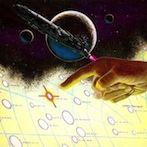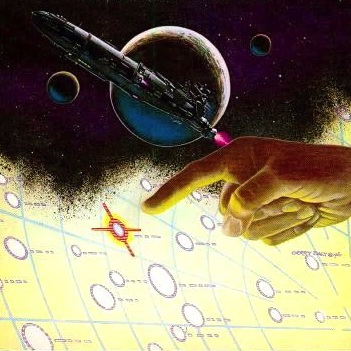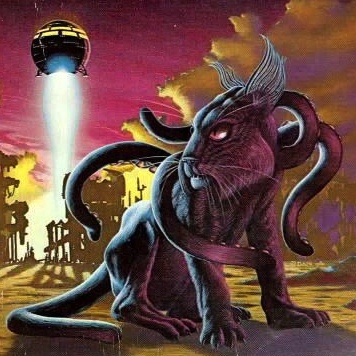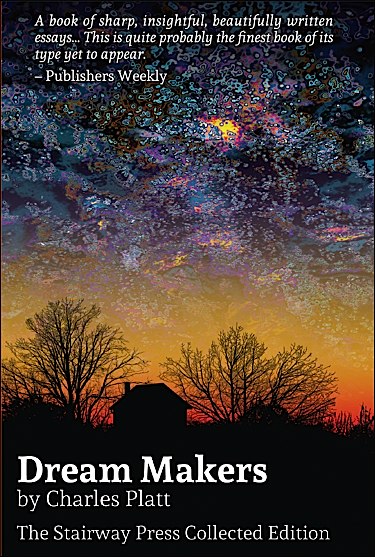The following article is copyright ©2014 by Charles Platt. It is reproduced by permission from the updated 2014 edition of Dream Makers, his classic book of SF author profiles.
Sunshine on swarms of gleaming machines. White highways, blue sky; white beaches, blue sea; white buildings; houses scatteed up across hazy hills of mauve and brown. Bare feet, blond hair, tanned bodies, faded jeans. Restless motion, teeming life in a fever-dream valley.
Lawn sprinklers casting rainbows; multicolored birds on power lines; lizards basking on the patio. Concrete, steel, and glass, among the bountiful vegetation: evergreens and succulents, jungle foliage nourished by perpetual sun.
Belden Drive is a narrow concrete road that snakes up into the hills. Mounded bushes, shrubs, and cacti surround Mediterranean-style houses at each bend in the street. The air is vibrant. Insects buzz and hum.
A. E. van Vogt's house is a Spanish villa with red-tiled roof and stucco walls. It stands in a niche on the hillside, not very far below the old HOLLYWOOD sign. The veranda overlooks a slope of lush greenery, down to the wide, flat valley of Los Angeles. To my eastern eyes it's a Pacific paradise transformed by wealth and technology into a new-world composite of Life and Future.
But I feel van Vogt is oblivious to his surroundings. He is not a Californian; he might as well be living in a log cabin, or a cave. The bright scenery of the West Coast seems irrelevant to his interests and his work, because its vivid images are trivial compared to the power of the resonant landscapes inside his mind.
Of course, many fantasists pursue their imaginations oblivious to reality around them. But this is especially true of van Vogt, first because he works more intimately with his subconscious than most writers, and second because much of his life has been spent looking inward, studying psychology and human behavior, primarily through Dianetics and hypnosis.
His science fiction is concerned with the power of rationality, and disciplines such as general semantics. But really, his talent has nothing to do with science or logic. It's an intuitive, wild talent, remarkable for its strangeness. When you open one of his novels, you open the subconscious. He writes dreams.
And by a weird method that he will explain in a moment, he dreams his writing. First, however, he describes how he originally became a writer, while still very young, in Canada (where he was born in 1912):
"A man called John W. Gallishaw wrote a book called The Only Two Ways to Write a Short Story. I borrowed it from the Winnipeg library, and I read it all the way through. It's an incredibly hard book to read; it's so long. It gave all kinds of examples. He had twenty stories in there, which he had numbered and analyzed line by line. He had an idea of writing a story in scenes of about 800 words, and each scene had five steps in it. If all those steps aren't there in their proper way, then there's something wrong with that scene. First, you let the reader know where this is taking place. Then you establish the purpose of the main character or the purpose of that scene. Then you have the interaction of his trying to accomplish that purpose. The fourth step is, make it clear: did he or did he not accomplish that purpose? Then the fifth step is that, in all the early scenes, no matter whether he achieves that purpose or not, things are going to get worse."
Van Vogt adopted this system, and has always used it, making him one of the few successful professional authors to have built his career on a popular "how-to" guide. He also learned to write in what Gallishaw called "fictional sentences":
"Every type of story has its own type of fictional sentence. I started by writing ‘confession' stories [for women's magazines]. These stories have to have emotion in every sentence. You don't say, ‘I lived at 323 Grand Street.' You say something like ‘Tears came to my eyes as I thought of my little room at 323 Grand Street.' And the next sentence, and the next sentence. I did that with the very first story that I ever wrote for them, which I called 'I Lived in the Streets,' about a girl who was put out of her room during the Depression. I went to the library every day and wrote one scene. I had just come back from a stint of working for the civil service in Ottawa, on the 1931 census."
It took him nine days of visiting the library to complete this story, and he sold it for $110. He was soon writing and selling more stories to "Confession" magazines.
"I wrote one story for a contest, and won the $1,000 first prize. It was a 9,000-word story. I would say that that would automatically mean between 1,000 and 1,200 sentences. It's not impossible to write 1,000 or 1,200 emotional sentences. It's impossible for an unorganized person, but not for somebody who thinks by a system."
The $1,000 first prize was worth a great deal in the early 1930s—it was equivalent to almost a year's salary in his civil service job. However, he became tired of this genre. He started writing plays for Canadian radio, at ten dollars a time. And then, a couple of years later, almost arbitrarily, he decided to try writing science fiction. His first story sold to Astounding Science Fiction, the most prestigious magazine in the field.
Once again, he developed a system:
"In science fiction you have to have a little bit of a ‘hang-up' in each sentence. Let's suppose, for example: The hero looks up toward the door." Van Vogt gestures toward the sunlit screen door of his living room, leading out onto the veranda. "He hears a sound over there. And something comes in. It looks like a man wearing a cloak. You don't quite know what's going on. Then, you realize this is not a human being. This creature or this being, whoever it is, has a sort of manlike shape. And this creature reaches into what now looks like a fold of its skin. It draws out a gleaming metal object. It points it at you. Is this a weapon? It looks like a weapon, but you don't know that for sure. It's a hang-up, you see. The author furnishes the information, but each sentence in itself has a little hang-up in it."
As he has been talking, almost hypnotically, with an eerie gleam in his eye, he has created such a mood of menace that, for a moment, the California sunshine seems less bright and the dreamlike description is nibbling at the edges of reality. He would say, perhaps, that this is through the power of his system, but I think it has more to do with the power of his personality and his intuitively shrewd choice of words and images. A system on its own is dull and mechanical, without inspiration to fuel it. Van Vogt goes on to describe how he realized his source for this inspiration:
"I didn't notice, right away, what I was doing. In science fiction I was writing for only one cent a word, so because I work slowly I would wake up anxious, thinking, work out my story. I'd go back to sleep, wake up anxious, each time thinking about my story. Then in 1943 in Toronto I suddenly realized. It took me all that time to realize what I'd been doing all those years. Had I been Cyril Kornbluth [who died aged thirty-five] I might never have found out how I wrote. It's a good thing my life went past a certain point!
"I took the family alarm clock and went into the spare bedroom that night, and set it for an hour and a half. And thereafter, when I was working on a story, I would awaken myself every hour and a half, through the night—force myself to wake up, think of the story, try to solve it, and even as I was thinking about it I would fall back asleep. And in the morning, there would be a solution, for that particular story problem. Now, that's penetrating the subconscious, in my opinion. It's penetrating it in a way that I don't think they'll be able to do any better, thirty centuries from now."
And so van Vogt derived his inspiration through his sleep, filling his science-fiction adventures with fantastic images, symbolic figures, a constant sense of discovery and revelation, and free, flying motion (aided by those telegraphic 800-word scenes, which enforced a fast pace). Some critics, such as Damon Knight, complained that van Vogt's plots didn't make logical sense, and consequently his books were failures. This seems as misguided to me as criticizing a dream on grounds of implausibility. Dreams are powerful because they are so full of change and contradictions, in violation of laws of everyday life.
Although his science fiction was highly successful, van Vogt stopped writing it fiction rather suddenly in the 1950s. I ask him exactly what happened.
"I'm a system-thinker, as I think I told you. I had observed that writers got passé, they became old-fashioned to the readers. Another generation comes up and it's about a ten-year cycle. So at the end of my first ten years in science fiction I thought, Well, the ten-year period is over, and all I can do now, is…I'm back in that earlier quaint reality, and there's a new reality coming up, and it'll be as real to the people reading those stories as if God said it Himself; you know, this is the reality of now. I thought, What should I do?
"Among other things, I wrote The Hypnotism Handbook, for a psychologist. That was in late 1949, though it was not published until 1950. Having written that book I thought I'd looked into human behavior a little bit, I must have gotten something out of it. Then I began to get letters from L. Ron Hubbard [interviewed elsewhere in this volume]. In 1950, shortly after the hypnotism book was published, he began to phone me, long-distance from New Jersey, every morning, and talk for an hour to get me interested in Dianetics. That kind of phone-calling, long distance, was completely out of my reality. It was beyond my conception that anybody was phoning that often, and talking that long, from 3,000 miles away.
"He made a statement around the seventeenth morning he called me, that 'We've got all kinds of people who want to send money to somebody out there, and there's nobody to send it to,' and I said, 'Tell them to send it to me and I'll guard it for you!' and I think I got altogether $3,400 in the next couple of weeks. It was sent for a course that they were going to give out here. Three days later a letter arrived appointing me head of the California Dianetics operation.
"The organization spent $500,000 in nine months and went broke, because at that time there were a tremendous number of attacks on Dianetics. We [in California] were the only branch that never did go into bankruptcy, because I don't believe in being involved in bankruptcy. An attorney friend and I went to see all the creditors, and they let us just fold it and pay what we could.
"One of the reasons why the book Dianetics impressed me was the fact that it had not one line of mysticism in it that I could detect. I didn't know, at that time, [editor John W.] Campbell had dissuaded Hubbard from putting any into it. You see previously I had met Hubbard in 1945; I had dinner with him and about a dozen other persons, and it became apparent to me that he was very mystically oriented. So when there was, later, not a line of that in the book I thought, by God, this has really got to be a good system, because it has already knocked that out of him!"
Dianetics has since been "incorporated into the framework of Scientology, as an earlier phase you have to go through," according to van Vogt, but he remains uninterested in Scientology, because of its mystical/religious aspects. He retains faith in the principles of Dianetics, and is still president of the Californian Association of Dianetic Auditors. He recalls personal experiences using the system:
"My wife [E. Mayne Hull] had been ill, and had had operations about every two years, starting almost within a year of our marriage, in 1939. She made her will at least six times during that period. When I talked to the doctors, every time they said, It looks like cancer. In 1951 there was another doctor that examined her, and said to me, We've got to watch out, that has all the sound of cancer.
"But right in there she got some [Dianetic] auditing, and the problem all faded away just like it never was. She was not sick again, she didn't go to a doctor, until we went to a funeral of a friend who had died of cancer in Phoenix in 1970. On he way back she said, It's like the end of an era; and she burst into tears. One month later she had blood in her urine and they examined her and this time they said, It is cancer. The point is, it had been put aside somehow by the Dianetic thing. Dianetics is essentially based upon Freudian therapy, but Freud allowed the patient to freely associate, and he never concentrated upon one incident. Dianetics concentrated upon one incident, going through it again and again. When that was done, things seemed to fade away. Certain incidents that my wife ran seemed to be keyed to her health; clearly they were not erased, they were just put back, you might say, into some slot."
Van Vogt recalls his work in Hubbard's Dianetic Research Foundation: "Hubbard, having a naval background, had his staff meetings at seven a.m. and I closed that place up at one o'clock at night, when he'd been gone many hours. I went home and went to bed at five-thirty or something like that.
"After the organization went broke, Mayne and I decided to open up our own Dianetics center here in Los Angeles. I partly supported it by putting books together from earlier short stories, because I charged very little at the center—seventy-five dollars for thirty hours of what we called project auditing. In the end I signed off somewhere around 1961."
But van Vogt didn't stop thinking about psychology, and inventing his own theories. At one point he realized that his system of tapping the subconscious, in order to write science fiction, could also be used as a kind of therapy.
"If you take an incident of severe, traumatic emotion, and wake yourself up every hour and a half, and think about it, go through it in your mind, and fall back asleep while you're doing that, it takes about two weeks, for a severe incident, before it fades.
"I have a book here which I ordered from the Department of Health and Welfare—their book on sleep and dreaming—and I read the summarization of all the discoveries that had been made, and it was quite evident, first of all, that my ninety-minute cycle was the correct one. I'd just chosen that automatically; an hour seemed too short. What the brain does, in the first hour and a half, it deals with the previous day: when they wake people up they're dreaming about the previous day. And then in the subsequent ninety-minute periods it's all back history, going into childhood. I would guess that the mind is trying to throw off the shock of the past, and keeps associating from one to the other to the other, and can never dispose of any of it. When it took me two weeks to dispose of a fear incident in my childhood, that seemd a very significant observation and discovery to have made. It faded, and another incident came into view, and I went on and on like that, working with fear incidents.
"The effectiveness of it is not easy to prove, but here's what happened when I was reading up on the background of Naples for a novel I wrote called The Darkness of Diamondia. I had a planet many light-years distant, called Diamondia, which had been settled by Italians, and they had sort of rebuilt Italy there. There was a place called New Naples, and they build it right under Vesuvius II, that kind of thing. So I read up on the history of Naples. It's a history of massacres, assassinations, murders, horrible continuous killing. It didn't bother me because I'd been reading before about human nature. But I ran across one incident that bothered me. Two fourteen-year-old boys were turned in as traitors and beheaded. For some reason or other that disturbed me. The next day, I couldn't seem to write, I felt distracted. And the next day, and the next. Two weeks went by, and I thought, my God, this thing is still running around—vivid images, running through my head. And so I thought, Why don't I try the dream therapy on that?
"By this time, I was using an industrial timer and a cassette recorder, not an alarm clock. An alarm clock you have to rewind and reset, whereas this works automatically every hour and a half."
I interrupt to ask him what the tape recorder says, when the timer turns it on.
"First of all it says wake up a few times, and, remember, you're doing dream therapy—on this subject!—because I could wake up with the alarm clock and not know what I was dealing with; completely blank.
"Anyway, so I put the memory of those two executions through my mind, went back to sleep; and again; and by six o'clock the feeling had faded. And it never came back. This was a small example of the effectiveness of the system. It's purely my own system. A complete invention of my own."
I ask him if he ever suggested to the Dianetics or Scientology people that they might be able to use this system.
"No, and I'll tell you why—because I don't see how anybody could charge for it!" He laughs. "It's not for a large organization with overhead expenses. It should be used as a supplement to daytime psychotherapy."
"My own feeling," he goes on, "is that psychiatry's going to have to be saved. I may try to save psychiatry, if you'll pardon the, ah…there is an MD who writes science fiction occasionally under the name T. J. Bass. He wrote a book called Half Past Human. It's loaded with good information. He runs thirty miles every day. He has overage patients. They start, they can barely stagger into the office, age seventy-three, they've heard about him and his system. And then they run the first 150 feet, and lie down, or whatever, and at the end of a certain period of time they're running with him thirty miles a day. I sent out an inquiry to many science-fiction writers asking, had they invented any new sciences of their own. His answer was, 'I think I've got the beginning of the science of immortality.'
"Now, in 1968 I had a beautiful one-year-old dog; she wanted to go out every morning, she'd come in and wake me up at eight o'clock, which was an unheard-of hour for me. I thought, well now's my time to conduct the experiment I've been planning for fifteen years. The Exercise Experiment. I went out with her on the eighth morning—after you've had somebody wake you up by licking your face with a big wet tongue eight mornings in a row, finally the thought penetrates, all right, the time has come for an experiment. So we went out.
"My theory was that exhaustion is an association with a past illness. Basically it's a Freudian-oriented theory. We started to jog. At the end of 150 feet I was absolutely exhausted. Theoretically I should have lain down and rested for a while. But the theory said no—the stress of that moment had forced an association with a disturbance from the past. I thought, What can this be, it's got to be some kind of an association from the past, by my theory, forced by the stress into the here-and-now, just as nervousness overtakes the person who's faced with public speaking. So I thought of an incident when I was aged eleven. I had been out with a bunch of kids on a very hot Saturday afternoon and we'd gone some distance. Coming back, I suddenly had a hard time breathing. In fact I couldn't stand up. I sat down beside the road, and just sat there for about an hour, totally exhausted. So I remembered this incident and mentally went through it a few times by the Dianetic scanning method, and the feeling of exhaustion faded! Then 150 or 200 feet later I felt another type of exhaustion, another feeling, and what was this? Well, all my illnesses kept coming into view, and particularly a fall that I had at age two-and-a-half—I was unconscious for three days at two-and-a-half, from falling out of a second-story window. So anyway, I continued to run, and we ran along this street here, Belden Drive, and then down on Beechwood, and the only time we stopped was when the dog stopped and when we came to the foot of the hill leading up to my house. I looked at that hill and I thought, well, let's consider that the human heart should not be put under total stress the first day or the second day, that kind of thing. So I walked up the hill, and I stopped six times on the way up, each time that I felt the exhaustion, and considered what it could be, and dealt with it, counting the pictures past my mind's eye.
"Now, I'm talking about saving psychiatry. See, I don't believe in running thirty miles a day. The mere thought makes me quail. I seem to remember that the world's record for thirty miles is about two hours and three-quarters. I do not propose to get involved in anything like that. It would be more like four and a half hours. Doing that every day sounds totally mad!
"However: if a psychiatrist were to have half a dozen patients, at so much an hour, running with him, and dealing with their cases as they went along, and then at night had them do dream therapy, a combination of these two things, I think that they could get a lot done. Running, if you're up to it, is an automatic-gain situation: a person is going to get a little healthier, no matter what's going on in his head. So I believe that that's the direction that psychiatrists should take."
I imagine a team of out-patients jogging around the Hollywood hills, accompanied by their therapist; one by one, the jogging neurotics experience exhaustion and make insightful mental leaps back to significant childhood traumas, which are exorcised in this sudden flash of association. But there seems to be a practical problem, in this scenario of jogging therapy. Isn't it awfully hard to run and talk to your psychiatrist at the same time? And even if you can gasp out your symptoms—what are the rest of the patients doing?
Van Vogt seems slightly irritated by such a mundane objection. "Well, they'd stop for a moment—some of them would keep on running back and forth, while he's talking to one guy. They could just go back and forth, and then everybody moves forward again."
But this conversation has taken us rather a long way from science fiction. I ask van Vogt how he returned to the field.
"I met Frederik Pohl in the early 1960s. He said, Why don't you write for Galaxy [the magazine that Pohl was then editing] so I wrote, first of all, ‘The Expendables,' and then ‘The Silkie'; and meanwhile I was working on a book called The Money Personality. I had gotten another system going. I had discovered that three men that I had known when I was in my teens had all gotten wealthy in Canada. That seemed incredible to me. So I went over it in my mind; How come they had made it into wealth, and here I am still working sixteen hours a day?"
I try another angle to get us back to science fiction again. Does he ever try to take advantage of living in Los Angeles, to write for the movies?
"I operate by systems, and until I have a system for writing screenplays, none will ever turn up from my pen. Many times have I had lunch with a story editor or director, and each time they require an outline [a description of the script that may be written]. An outline I cannot write, but I tried, each time. I would then present this unfinished (as it turned out) outline, which they couldn't make head or tail of, in their world. Then a few years later I would come across this thing, and I'd think, well, I can write a short story around this, which I would then do.
"I don't know what the problem is. You see I work a story out as I go along. . . ."
Couldn't he work an outline out as he goes along?
"No, I don't seem to be able to do that. That's not the way I work. But I joined the Writers' Guild at the beginning of this year. They announced a course, once a month, where some of their great writers of screenplays would explain the writing of these things. I took my retired attorney friend with me and we went and listened, and a couple of thoughts have penetrated, up here." He taps his head. "The beginning of a system. Now, if I ever get a system, they'd better watch out!"
And the funny thing is, he's probably right; after all, his "systems" have enabled him to achieve considerable success in the fields of writing that he has tackled in the past.
After the interview, he invites me to a meal down at a restaurant in the valley. He has recently received large royalties from sales of his work in France, where he is an extremely popular writer; I think he feels like sharing a little of the largesse. Also, I sense he does not receive too many visitors these days, and since the sad death of his wife, the house feels a bit empty. (This interview was prior to Mr. van Vogt's second marriage, later in 1979.)
So we walk out to his car, which is an aging black Cadillac—old enough to possess tail fins. The car's license plate reads NOT A. Van Vogt comments that people stop alongside him in traffic and ask, "Not a what?" But of course the cryptic statement refers to his two novels about "non-Aristotelian" (i.e. multivalue) logic—which is another system he advocates.
We drive, extremely cautiously, down the narrow, winding road, in the giant old car. The tentativeness of this foray into the outside world seems to emphasize my impression that he has no special love or need for the California landscape bursting with life all around us.
Over the very pleasant, neutrally American meal, he remarks that "Were it not for having run into science fiction and gained some consciousness-expansion, I would have ended up a clerk in the Canadian government."
He sounds, as always, logical and matter-of-fact about it, but I know that this impression is misleading—for logic means a different thing to van Vogt from what it means to me, as does reality. Nor does it end here, because, as we will see in the next profile, van Vogt's visions have influenced other writers in the science-fiction field. His strange dreams, themselves a distortion of the world, have been used as a mere starting point for fiction that goes still further into metaphysical realms—and yet, paradoxically, also returns closer to everyday life.
Note: in describing van Vogt's decision to join Dianetics, I have inserted within the taped monologue three sentences drawn from his own small autobiographical book, Reflections of A. E. van Vogt (Fictioneer Books, 1975). The sentences were added for the sake of clarity.
Historical Context
The movie Alien was released very shortly after I interviewed A. E. van Vogt. When he saw it, he felt convinced that it was derived from his very first published science-fiction story, "Black Destroyer," which appeared in Astounding Stories in 1939. It described the invasion of a spaceship by an alien creature, and set a new standard for the depiction of alien life forms with a detailed set of attributes and a complex biology.
Although Twentieth Century Fox denied that Alien was derived from any of van Vogt's work, they settled out of court in 1980 for a reported $50,000.
He was single when I met him, but met his second wife, Lydia Bereginsky, when he advertised for native speakers of foreign languages in connection with a system he had devised that would help people to learn languages quickly. She was a former model and still a very elegant woman.
In subsequent years I saw them a couple of times at science-fiction events, where dowdiness was the norm and T-shirts and jeans were common. Van Vogt always wore a dark-blue suit, while his wife was elaborately coiffeured, wearing a floor-length dress and jewelry. They drifted through the scruffy crowd like visitors from another planet.
In the early 1990s, when he was diagnosed with Alzheimer's disease, his wife demonstrated her devotion to him by maintaining his business affairs and basically managing his life until he died in 2000.
My original profile mentioned that Damon Knight had criticized van Vogt's work, but the full significance of this requires some additional explanation. Knight's highly influential book about science fiction, In Search of Wonder, included a chapter-long essay (reprinted from a fanzine) which damaged van Vogt's reputation in the field for many years. Titled "Cosmic Jerrybuilder: A. E. van Vogt," it was such an intemperate diatribe, it might have cast aspersions on Knight's abilities as a critic if he had not already established himself as an arbiter of taste in science fiction. He described The World of Null-A as "one of the worst allegedly-adult science fiction stories ever published," and characterized van Vogt as "a pygmy who has learned to operate an overgrown typewriter."
Van Vogt was sufficiently disturbed by the critique that he actually revised the book for a subsequent edition and added a new introduction, in which he wrote:
Singlehandedly, Knight took on this novel and my work at age 23-1/2, and, as Algis Budrys puts it, brought about my "destruction."
So what's the problem? Why am I now revising World [of Null-A]? Am I doing all this for one critic?
Yep. But why?—you ask.
Well, on this planet you have to recognize where the power is.
"On this planet" was hyperbole, but in science fiction, van Vogt was correct about Knight's influence at that time.
The destructiveness of the attack was surprising. I think that Philip K. Dick had it right when he gave this mild-mannered but accurate rebuttal while being interviewed for a little magazine named Vortex, in February 1974:
Damon feels that it's bad artistry when you build those funky universes where people fall through the floor. It's like he's viewing a story the way a building inspector would when he's building your house. But reality really is a mess, and yet it's exciting. The basic thing is, how frightened are you of chaos? And how happy are you with order? Van Vogt influenced me so much because he made me appreciate a mysterious chaotic quality in the universe which is not to be feared.
I love the comparison of Damon Knight to a building inspector who fusses about code violations instead of admiring the originality of the architecture. I think there's some truth in that. And I love the idea of a "funky universe" in which nothing quite adds up.
The work of A. E. van Vogt enthralled me when I first discovered it, and even now, if I read just the opening page of "Black Destroyer" (which was incorporated with other stories in the book titled The Voyage of the Space Beagle), the text still exerts a mysterious power. He had a very unusual talent.
He died in January 26, 2000 after suffering Alzheimer's for many years.








